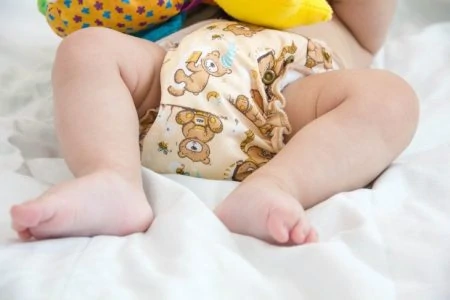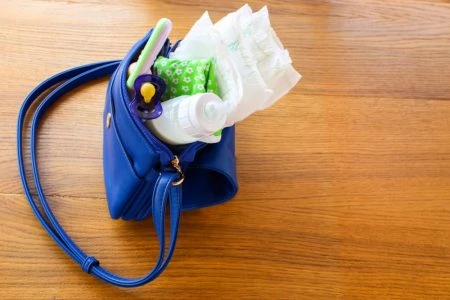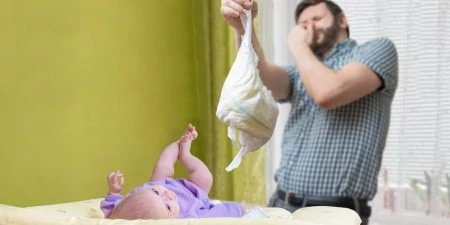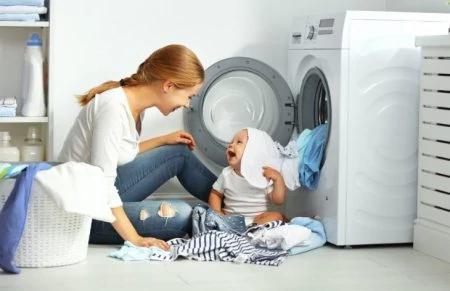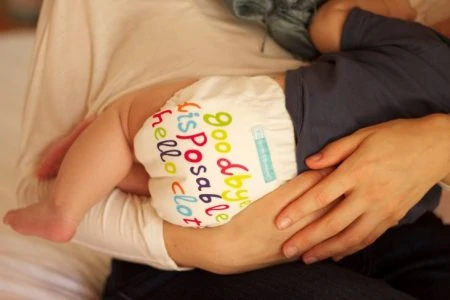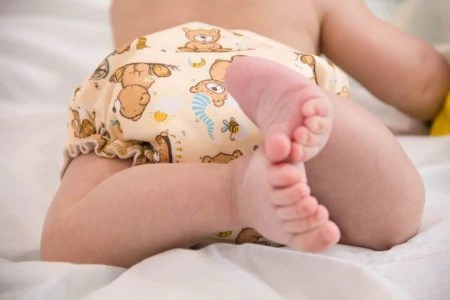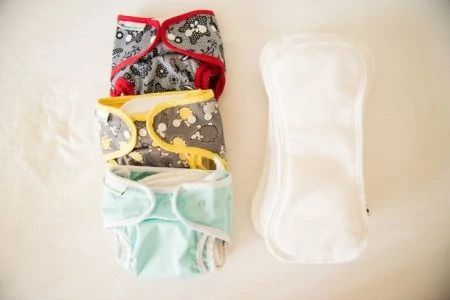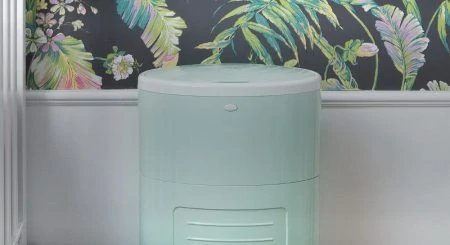You open the diaper pail, and it hits you. We aren’t talking about the standard dirty diaper smell; we mean a sharp, eye-watering stench that clears the room. If that sounds familiar, you are battling ammonia.
This chemical reaction happens when urine breaks down over time, usually due to wash routine issues, hard water, or dehydration. It is frustrating, but you are not alone.
We have been there, and we know you need to fix this fast. Ignoring the problem can lead to persistent odors and nasty chemical burns on your baby’s sensitive skin.
In this guide, we will break down exactly why this happens and give you a step-by-step plan to banish the stink for good. Here is how to get your cloth diapers smelling fresh again.
Key Takeaways
- Identify the cause: Ammonia is usually caused by hard water mineral buildup, wash routines that don’t use enough detergent, or letting diapers sit too long.
- Treat the buildup: Deep clean diapers using a bleach soak for bacteria or a stripping treatment for mineral deposits to reset the fabric.
- Prevent recurrence: Adjust your routine by washing every 2-3 days, using a water softener if needed, and switching to natural fiber inserts.
- Watch for burns: Ammonia can cause chemical burns that look like flat, red patches; treat these with a thick barrier cream rather than standard rash remedies.
What Is Ammonia?
That distinct smell is actually a chemical reaction. It occurs when the amount of waste in urine outweighs the amount of fluid.
Urine contains urea, a byproduct of protein breakdown. When a person is well-hydrated, urea stays diluted and relatively odorless. However, when urea decomposes further, it turns into ammonia (1).
If a baby is dehydrated or if a wet cloth diaper sits too long without airflow, bacteria break that urea down rapidly. This creates strong ammonia fumes that cling to the fabric fibers.
Causes of Ammonia in Cloth Diapers
To fix the problem, you first have to know where it started. Understanding the root cause prevents you from getting stuck in an endless cycle of stripping and bleaching.
Here are the five most common culprits behind the stink:
1. Hard Water Buildup
Hard water is the enemy of cloth diapers. It contains high levels of minerals like calcium and magnesium. Over time, these minerals get trapped in the fabric fibers.
This mineral buildup traps bacteria and prevents your detergent from penetrating the material effectively. If the detergent can’t get in, the pee can’t get out.
Test Tip
2. Wash Frequency
Time is a major factor here. The longer urine sits in a pail, the more time urea has to convert into ammonia.
If you wash your diapers every five to seven days, you are giving bacteria a head start. Diapers left in enclosed diaper bags or diaper pails without airflow will develop that nose-stinging smell much faster.
3. Too Much Detergent
It sounds counterintuitive, but more soap does not equal cleaner diapers.
If you use too much detergent, your washing machine struggles to rinse it all out. This leaves a soapy residue on the diapers that acts like a magnet for bacteria and urine. This “detergent buildup” creates the perfect environment for ammonia to thrive.
4. Too Little Detergent
On the flip side, weak wash routines are also a problem.
If you rely on just water or a tiny amount of eco-detergent, you might not be removing the waste effectively. Cloth diapers are heavily soiled laundry; they need a robust surfactant to lift urine and feces out of the fibers. If the pee stays in the fabric, it will turn to ammonia.
5. Concentrated Urine
Sometimes the issue is biology, not laundry. Newborns on a liquid diet have very dilute urine. As babies grow and start eating solids, their urine becomes more concentrated.
Older babies also sleep longer stretches. A “nighttime diaper” might hold 10 to 12 hours of urine. That is a lot of urea sitting in a warm, wet environment, which explains why the morning diaper often smells the worst.
4 Ways To Eliminate Ammonia Smell
If your diapers already stink, a regular wash cycle won’t cut it. You need to reset your stash.
Here are the best methods to strip the buildup and neutralize the odor.
1. Use an Enzyme Cleaner
Enzymes break down organic waste. A specialized cleaner like Bac-Out by Biokleen actively “eats” the biowaste causing the smell.
How to use it:
- Pre-treatment: Spray the soiled diaper with the enzyme cleaner before tossing it in your diaper pail.
- Soak: For set-in odors, spray the diapers and let them sit for 15 minutes before starting your wash cycle.
2. Perform a Bleach Soak
If enzymes fail, you likely need to sanitize. Bleach soaking your diapers is the most effective way to kill the bacteria producing the ammonia (2).
How to use it:
- Clean diapers only: Start with clean, wet diapers.
- Dilute: Fill a tub or sink with cold water and add proper disinfecting bleach (check the bottle for dilution rates, usually 1 tbsp per gallon).
- Soak: Submerge diapers for 30 to 45 minutes.
- Wash: Rinse with hot water, then run a heavy-duty hot wash cycle with detergent.
Bleach Note
3. Strip Your Diapers
If hard water minerals are trapping the smell, bleach alone won’t reach the bacteria. You need to remove the mineral buildup first. This process is called “stripping.”
You can use treatments like RLR Laundry Treatment or GroVia Mighty Bubbles.
- RLR Method: Add one packet of RLR to a tub of hot water with up to 30 diapers. Agitate them, then let them soak for 4 to 6 hours (or overnight). Rinse until no suds remain, then wash as normal.
- GroVia Mighty Bubbles Method: These are convenient pods. Place one pod in the washer with 24 wet diapers. Run a heavy-duty hot wash with no other detergent. Follow up with a plain hot rinse.
Bulk Diaper Note
4. Pre-treat with Baking Soda
For mild odors, simple household ingredients can help. Baking soda is a natural pH neutralizer and deodorizer (3).
Add a half-cup of baking soda to your pre-wash cycle. This helps neutralize the acidic urine and boosts the power of your detergent.
Can Ammonia Smell Be Prevented?
Once you have reset your diapers, you want to keep them fresh. Prevention is usually about tweaking your routine.
Here are five ways to stop the stink from coming back.
1. Wash Every 2-3 Days
Reduce the time urine sits in the fabric. If you currently wash once a week, try moving to a schedule of every two or three days. This simple change prevents the chemical breakdown of urea into ammonia.
2. Hydrate Your Baby
If your baby is eating solids, ensure they are drinking enough water or milk. Dehydration leads to concentrated, pungent urine.
Sign to watch for: If you see orange or pinkish “brick dust” stains in a wet diaper, those are uric acid crystals. This indicates highly concentrated urine.
3. Switch to Natural Fibers
Microfiber inserts are notorious for holding onto stink. The material consists of tiny loops that trap dirt and bacteria, making them difficult to rinse clean.
Consider switching to natural fiber inserts like cotton, hemp, or bamboo. These fabrics release soil more easily in the wash and are less prone to ammonia buildup.
4. Add a Water Softener
If you have hard water, you must soften it. Detergent binds to minerals instead of cleaning your clothes.
Adding a powder water softener (like Calgon or Borax) to your main wash cycle helps the detergent do its job. It prevents minerals from redepositing onto the diapers.
5. Rinse Before Pailing
Nighttime diapers are heavy with urine. Instead of tossing them straight into the pail, take them to the sink or toilet. Rinse them thoroughly with warm water and wring them out. This removes the bulk of the urine before it has a chance to break down.
A Word on Ammonia Burns
This is the scariest part for parents. Ammonia is a caustic chemical. If it builds up in the fabric, it activates as soon as the baby pees, creating a chemical burn.
This is not a standard diaper rash.
What it looks like:
- The skin looks “sunburned” or bright red.
- The rash is flat and blotchy, not bumpy.
- It may smell like chemicals.
- In severe cases, the skin may blister or weep.
How to treat it:
You need a barrier. Because this is a burn, you want to protect the skin from further contact with urine. Use a thick diaper rash cream.
I highly recommend Triple Paste for severe irritation. It is thick, medicated, and provides excellent protection. If you use synthetic fibers like microfiber or charcoal, use a liner, as thick creams can cause staining or repelling.
If the burn blisters or doesn’t improve after a few days of treatment, consult your pediatrician immediately.
Ammonia and Cloth Diaper FAQs
The Ammonia Diaper Struggle
Dealing with stink issues is a rite of passage for many cloth diaper parents. It doesn’t mean you are failing; it just means your routine needs a tweak. Whether it is battling hard water or adjusting your wash frequency, the solution is usually simple once you identify the cause.
Don’t give up on cloth just yet. With a good strip, a bleach soak, and a few preventative habits, you can get back to fluffy, fresh-smelling diapers in no time.
